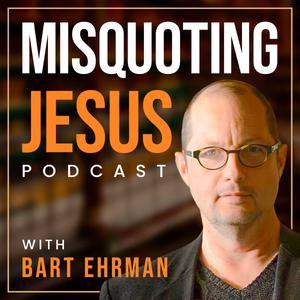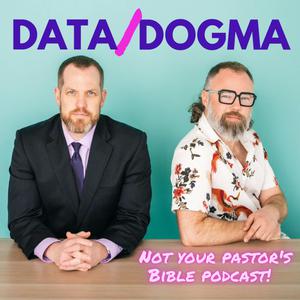
Misquoting Jesus with Bart Ehrman
Bart Ehrman
- 55 minutes 26 secondsHow do we separate history from myth in the Gospels
The question of how much of the Bible is historically accurate, and how much is myth or legend, is both interesting and important to a lot of people - believer and atheist alike.
Some insist it’s accurate down to the last detail, while others label it as fairy tales from beginning to end. In this episode, Dr. Bart Ehrman unravels how scholars distinguish history from myth within the Gospels of the New Testament, why it’s important to do so, and exactly what a “myth” is.
21 January 2025, 7:30 am - 50 minutes 37 secondsHidden Wisdom or Heresy? The Enigma of the Gospel of Thomas
Start talking about the Gospels, and most people will have a rough idea of what you’re talking about - a narrative account of Jesus’ life.
Today, however, we throw all of that familiarity out of the window and talk about one of the most non-Gospel Gospels I’ve ever read, the enigmatic apocryphal Gospel of Thomas!
14 January 2025, 7:30 am - 45 minutes 35 secondsChurch vs Universities: Who Gets the New Testament Right?
Is there a difference between how the New Testament is taught in church versus a university?
In this episode, New Testament scholar Hugo Mendez joins us to explore the devotional approach to the Bible often found in churches and how it contrasts with the critical, historical methods used in academia.
We discuss what surprises students about studying the New Testament in a classroom setting, whether one approach is ‘right,’ and how both can offer valuable insights for Christians, skeptics, and truth-seekers alike.
7 January 2025, 7:30 am - 39 minutes 19 secondsThe Scholar and the Savior: Bridging Belief and Critical Study
In this episode, we sit down with Bible scholar John Edwards to explore how critical scholarship can deepen one’s faith.
John shares his personal journey of reconciling faith and academia, offering insights into how studying the Bible critically can inspire and enrich Christian belief.
Join us as we discuss the positive impact of Jesus and the Bible in the modern world.
31 December 2024, 7:30 am - 53 minutes 13 secondsOne BC: The World Jesus Entered
What was the world like just before Jesus was born?
In this special Christmas Eve episode, we explore the political, cultural, and religious climate of 1st-century Palestine with world-renowned archaeologist Dr. Jodi Magness.
From Roman rule and Jewish life to messianic expectations, Dr. Magness helps us understand the historical backdrop that shaped the world Jesus entered.
24 December 2024, 7:30 am - 36 minutes 32 secondsIs Jesus For Non-Christians, Too?
Most Christians would likely agree that Jesus and the Gospels provide us with guidance for how we should be living our lives. People of non-Christian faith traditions, or those with no religious belief at all, might have a somewhat different response...but our guest today, Dr. Amy-Jill Levine, is here to talk about how non-Christians can find value in Jesus and the Gospels, and why they should take another look at the New Testament!
17 December 2024, 7:30 am - 45 minutes 6 secondsWas Jesus Really Born in Bethlehem?
Most of us know the story: Jesus was born in Bethlehem but grew up in Nazareth. Both Matthew and Luke agree on this, but key details raise questions for scholars.
Join Bart Ehrman and Megan Lewis as they dive into why the Gospel writers placed Jesus’ birth in Bethlehem. Was it historical fact or shaped by theology? Why does Luke have Mary travel 100 miles while pregnant? And why does Matthew’s story send the family fleeing to Egypt?
10 December 2024, 7:30 am - 41 minutes 29 secondsGospel Discrepancies: Why Matthew and Luke Tell Different Christmas Stories
When you picture the story of Jesus’ birth, you might think of Mary and Joseph traveling to Bethlehem, a stable, shepherds, and wise men. But have you ever wondered which details come from which Gospel—and why the accounts differ?
Join Bart Ehrman and Megan Lewis as they explore questions like: Were Mary and Joseph from Nazareth or Bethlehem? Did they flee to Egypt after Jesus’ birth, or go straight home? And can these accounts be reconciled into one story?
3 December 2024, 7:30 am - 34 minutes 24 secondsThe U.S. as the “New Jerusalem?” Revelation’s Influence on Immigration
As you can probably tell from my incredibly strong accent, I (Megan) am an immigrant to the United States. As such, the US immigration system has been a rather large feature in my adult life…but I’ve never before considered the relationship between American immigration and the Bible, or more specifically, the book of Revelation.
It’s never really occurred to me that such a relationship even exists. In contrast, my guest today has written an entire - and absolutely fascinating - book on the subject, and we’re going to be diving right into it!
We’ll be exploring how Revelation has been used throughout US history to categorize, demonize, and vilify immigrants, while also painting the US as the New Jerusalem, sanctuary for God’s chosen, which must be defended at all costs.
26 November 2024, 7:30 am - 30 minutes 2 secondsDoes John of Patmos accept the Gospel of Jesus?
The book of Revelation is by far the most violent book of the New Testament.
The blood-soaked narrative calls for the death and destruction of non-believers and even of many Christians. Some Christians over the reveled in the horrific torments and the rivers of blood described in the book; but what would the historical Jesus have thought of it?
Would the Savior who instructed his followers to love their neighbors, to give up all their worldly possessions for those in need, and to care deeply for strangers and outcasts? have been on board with the wholesale slaughter of those who don’t fit the mold? Let’s find out!
19 November 2024, 7:30 am - 47 minutes 59 secondsThe Incredible Gospel of Judas (Iscariot)
How would you respond if I told you that, actually, Judas was the only disciple who understood what Jesus was doing on earth? Or that I said that Jesus is unrelated to the God who created the world? Or that the God who created the world is not the same as the one who created humans?
From a modern Christian point of view, those are blasphemous statements - some more so than others, yet they are all paraphrasing an early Christian Gnostic text, known as the Gospel of Judas. Join us today on Misquoting Jesus to find out more about this surprising, esoteric gospel, and to learn the secrets of the world according to the Gnostics.
12 November 2024, 7:30 am - More Episodes? Get the App
Your feedback is valuable to us. Should you encounter any bugs, glitches, lack of functionality or other problems, please email us on [email protected] or join Moon.FM Telegram Group where you can talk directly to the dev team who are happy to answer any queries.
 The Bible For Normal People
The Bible For Normal People
 The Bart Ehrman Blog Podcast
The Bart Ehrman Blog Podcast
 Within Reason
Within Reason
 Biblical Time Machine
Biblical Time Machine
 Data Over Dogma
Data Over Dogma
 TheThinkingAtheist
TheThinkingAtheist